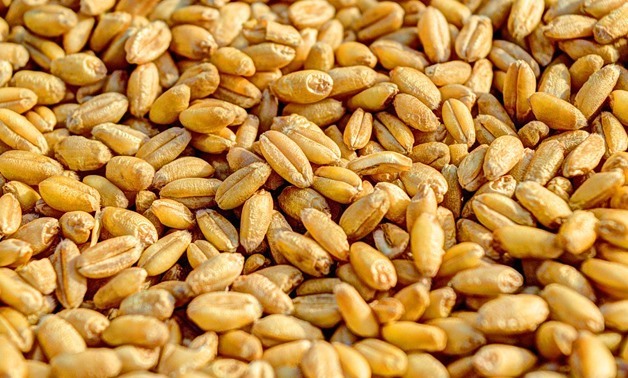
Farmers harvest wheat on Qalyub farm in the El-Kalubia governorate, northeast of Cairo, Egypt May 1, 2016. – (Reuters)
CAIRO - 1 March 2022: It is targeted to supply 5.5 million tons of local wheat during the supply season, which will start in mid-April, according to Minister of Supply and Internal Trade, Ali Al-Moselhi,
Al-Moselhi indicated in a TV statement that Prime Minister Mostafa Madbouly directed an increase in the number of wheat collection points, easing procedures in addition to facilitating small farmers. He also directed setting special rules for small spaces.
He added that the second meeting of the Wheat Higher Committee and coordination with the Ministry of Agriculture was held, noting that the area of cultivated lands this year amounted to 3.6 million feddans, producing between 9 and 10 million tons of wheat.
The minister pointed out that the current year witnessed an increase in the cultivated areas in the Toshka area by about 250 thousand feddans, with expectations to increase to 500 thousand feddans during the next year, reaching 1 million feddans in 2025, which will save about $1 billion from the wheat import bill.
Al-Moselhi stressed that the national project for silos was able to preserve the wheat well, ranging from 12 to 18 months. He pointed out that the storage capacities amount to 3.4 million tons, in addition to the silos of mills and ports, and the plan to establish 60 field silos is underway to establish 8 silos, and 4 silos will be received soon, each with a capacity of 5,000 tons.
He stressed that there is no crisis in the provision of wheat, pointing out that the strategic reserve of wheat is sufficient for up to 4 months, equivalent to 3.8 million tons, including about half a million tons of local wheat stockpiled from last year.
The minister pointed out that the wheat purchase bill amounts to about LE 40 billion annually, of which about LE 18 billion are for local wheat, and between LE 20 and 22 billion is the import bill for wheat.
He pointed out that the price of a ton of wheat globally increased during a year from $250 to between $334 and $350 per ton, i.e. an increase of about $100 per ton globally within a year.
Al-Moselhi explained that what is happening between Ukraine and Russia does not affect Egypt only, but affects the whole world and all global markets, and commodities, especially oil, gas and wheat, noting that any change in these commodities affects the rest of the commodities, noting that about 30 percent of the world's wheat supply comes from Russia and Ukraine.
Regarding the General Authority for Supply Commodities canceling Monday’s tender to import wheat, Al-Moselhi said that there were no suppliers from Russia or Ukraine due to the continuation of the uncertainty, but suppliers from France and the United States of America came forward to supply hard wheat (more expensive than soft wheat), which is used in the pasta industry, and therefore the tender was canceled.
The minister stressed that the arrival of a shipment from Ukraine that had been contracted earlier was secured, pointing out the keenness of both countries to preserve wheat and energy away from any crisis and conflicts.
Al-Moselhi mentioned the government's keenness to diversify its origin, as imports are made from about 14 countries, during the current year, about 29 percent of Russian wheat, 34 percent of Romanian wheat, 23 percent of Ukrainian wheat and the rest from France. He pointed out that he held a meeting with the French ambassador before the Russian-Ukrainian crisis, in which he expressed his country's readiness to provide any quantity of wheat.
He indicated in March 2017, that the strategic reserve of wheat was weak, only enough for up to 18 days, adding that the political leadership directed to increase the strategic reserve of basic commodities to reach 6 months, with a minimum of 3 months, pointing out that financial credits equivalent to $1.8 billion were provided.

Comments
Leave a Comment